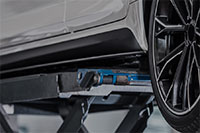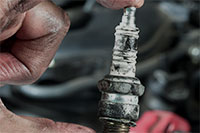Understanding Vehicle Spark Plugs
The Functionality and Maintenance of Glow Plugs and Spark Plugs
Why They Are Needed: Glow plugs and spark plugs are essential components in different types of engines, each playing a crucial role in the ignition process necessary for engine operation. While glow plugs facilitate starting and efficient operation in diesel engines, spark plugs are indispensable for igniting the air-fuel mixture in gasoline engines, thereby affecting overall engine performance and efficiency.
Spark Plugs:
- Functionality: Spark plugs are integral to gasoline engines, igniting the air-fuel mixture through an electric spark. Unlike diesel engines, which rely solely on compression to ignite the fuel, gasoline engines require spark plugs to initiate combustion. Operating at temperatures between 500-800°C, spark plugs convert electrical energy into sparks, igniting the compressed fuel-air mixture and sustaining engine operation.
- Maintenance and Replacement: Regular inspection and replacement of spark plugs are essential to maintain optimal engine performance and fuel efficiency. Symptoms of worn or dirty spark plugs include misfires, rough idling, and increased fuel consumption. Replacement intervals typically range from 45,000 to 120,000 km, depending on the manufacturer's recommendations and plug type.
Glow Plugs:
- Functionality: Glow plugs serve a critical role in diesel engines, aiding in engine starting, particularly in cold conditions. As diesel engines rely on air compression for ignition, glow plugs preheat the combustion chamber, ensuring reliable starting by elevating temperatures to approximately 700-900°C. This assists in generating sufficient heat for combustion, especially during cold starts.
- Maintenance and Replacement: While glow plugs generally require less frequent replacement than spark plugs, regular checks are necessary, especially before colder seasons. Symptoms indicating potential glow plug issues include difficulty starting in cold weather, rough idling, or increased fuel consumption.
Additional Maintenance Guidelines:
- Preventive Maintenance: In addition to regular checks and replacements, consider preventive maintenance measures for glow and spark plugs. This may include using fuel additives to clean fuel injectors and combustion chambers, which can help reduce carbon buildup on spark plugs and extend their lifespan.
- Professional Inspection: While some maintenance tasks can be done at home, consider having a professional mechanic inspect your glow and spark plugs during routine servicing. They can provide a more thorough assessment and recommend any necessary repairs or replacements.
- Quality of Fuel: The quality of fuel used in your vehicle can also affect the performance of glow and spark plugs. Using low-quality or contaminated fuel can lead to deposits and fouling on the plugs, reducing their effectiveness and potentially causing engine issues.
- Storage Considerations: If you're storing your vehicle for an extended period, take precautions to protect the glow and spark plugs. Consider using a fuel stabilizer to prevent fuel degradation and remove the plugs for inspection and cleaning before storage.
Maintenance Guidelines:
- Regular Checks: Incorporate regular inspections into routine vehicle maintenance to detect signs of wear or damage, ensuring connections remain secure and corrosion-free.
- Clean and Replace When Needed: Adhere to recommended replacement intervals to prevent engine complications. Prompt replacement may be necessary if signs of malfunction, such as hard starting or engine misfires, are observed.
- Use Correct Specifications: Always utilize glow plugs and spark plugs that meet the manufacturer's specifications to safeguard against engine damage and uphold optimal performance.
We hope you find this sweet and short article about Vehicle Spark Plugs useful.










